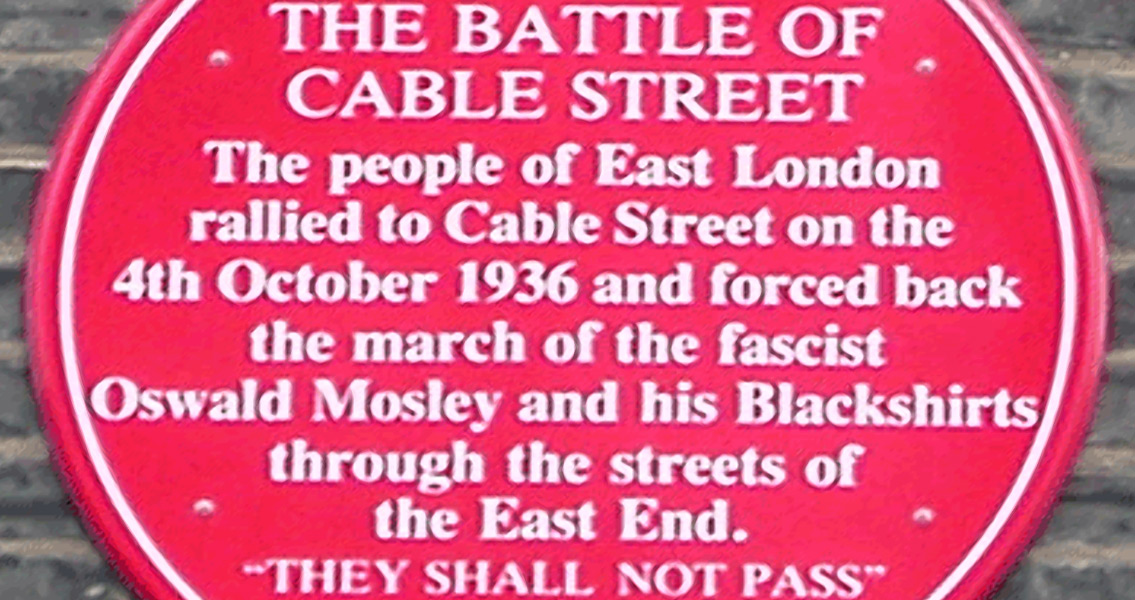<![CDATA[Armed with chair legs, rotten food and marbles, the residents of London's East End successfully prevented a march by Oswald Mosley's British Union of Fascists (BUF) on 4th October, 1936. The Battle of Cable Street, as it is now known, has become a central story in the narrative of British anti-fascism, held up as an example of staunch defiance in the face of the fascist political ideology which had been aggressively gaining support across Europe. In 1936 Britain was still reeling from the effects of the Great Depression while also suffering a massive unemployment crisis. The planned BUF Blackshirts' march through East London, which then, as now, had one of the highest immigrant populations in England, was designed to rally support for the BUF's anti-immigration rhetoric. Since the outbreak of the Great Depression fascist parties on the continent had taken advantage of the increasingly volatile situation. Hitler had taken power in Germany, bringing a wave of nationalism to a country divided in the aftermath of the First World War, while before that Benito Mussolini had seized power in Italy. Oswald Mosley, who had visited Mussolini's Italy, set up his party to try and win political success for fascism in England. The BUF, perhaps providing a poignant comparison to far right organisations today, sought to win support by staging actions in England's poorest, and most diverse areas. By 1936 the Jewish population of Brtian stood at 350,000 people, or 0.7% of the total population. Nearly half of that number lived in London's East End however, which also had a large Irish immigration population. Throughout the summer of 1936 Mosley's Blackshirts had gone to the area to try and stir up tension, holding public meetings, vandalising Jewish owned property and even taking part in physical attacks. Despite protests from local Jewish organisations, Mosley's Blackshirts were given permission to march through London's East End on 4th October, 1936. Even with an escort of some 10,000 police officers, the march was unable to complete its route as planned. Estimates vary, but sources claim that a force of some 300,000 anti-fascists turned out on the streets of East London to turn the marchers away. This force, made up of local Jews as well as Irish dockworkers, Communist Party members and others from the local community, constructed barricades along Cable Street to prevent the march. Conflict erupted as the protesters engaged both the Blackshirts and the police assigned to escort them. Children threw marbles under the feet of police horses to halt their advances, while residents in the area attacked the march with rotten food, pieces of old mattresses, and paving slabs. The anti-fascists chanted 'No pasaran' (they shall not pass), a popular slogan of the Republican forces in the Spanish Civil War. The Battle of Cable Street lasted several hours, until London's Police Commissioner told Mosley to cancel the march. The event was a humiliation for the BUF, although as police files released at the National Archives in Kew show, members of the BUF nevertheless held a number of meetings and smaller marches at other locations around East London that day, to significant numbers of people. A major consequence of the Battle of Cable Street was the Public Order Act, a piece of legislation passed in the same year which made the wearing of political uniforms in public, private armies, and the use of threatening language illegal. The act also afforded the Home Secretary the power to ban marches. Ever since October 1936, the Battle of Cable Street is remembered as a moment of triumph, when an East London community gathered in solidarity against representatives of fascism and anti-antisemitism in the UK. This is a narrative which fit well in the context of Britain's fight against Nazi Germany in later years, establishing an image of Britain as a country steadfastly anti-fascist. Although this triumphant reading of the Battle of Cable Street is true, there is a danger that it can over simplify the context, leading to a failure to acknowledge just how much influence the BUF held in the 1930s. At a time when immigration is again a massive talking point in politics and the media, the anniversary of the Battle of Cable Street seems particularly pertinent.]]>
The Battle of Cable Street: 1930s Attitudes on Immigrants
